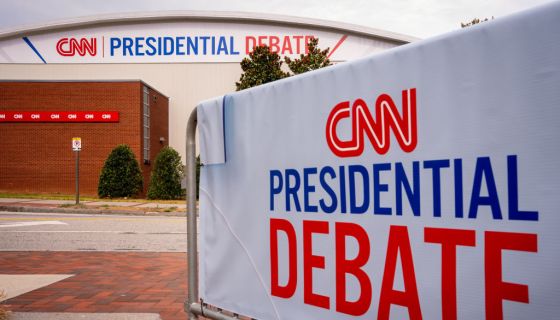Something in the water ain’t clean…
If you’ve ever worked in the world of Black journalism, you likely understand how often Black reporters and publications get snubbed when it comes to opportunities to cover certain major events like, say, the first debate to decide who will be the next president of the United States.

Source: Andrew Harnik / Getty
On Thursday, ahead of the first in-person debate between incumbent President Joe Biden and former President Donald Trump, the network that is hosting the face-off, CNN, is pushing back on accusations that it has neglected to include representatives for Black-owned media outlets among the 800 some-odd journalists who will be covering the event.
The controversy started when famed Black journalist Roland Martin, who used to be a regular CNN contributor, called the network out Wednesday, claiming that it had “not issued ANY credentials for tomorrow night’s debate to ANY Black-owned media outlets.”
On the same day Martis sounded off on the lack of Black media presence at CNN, Donnell Suggs, the editor-in-chief at the Atlanta Voice, one of the city’s oldest Black newspapers, told the Atlanta Black Star, another major Black publication based in the city, that he hadn’t received any communication from CNN regarding the event.
“It was disrespectful. I thought it was very tacky not to invite the Black newspaper,” Suggs said. “I thought that was just cheap and typical of CNN.”
Suggs has since posted video footage of President Biden’s arrival while continuing to call out CNN.
He also shared that he’s the only member of the Black press at the debate’s White House Press Pool.
Later, the Congressional Black Caucus joined the chorus line of Black people and organizations who were wondering what gives with CNN’s exclusion of Black journalists, because clearly something is awry.
From NewsOne:
Speaking on behalf of the CBC, CBCPAC Chairman and New York Rep. Gregory Meeks said it was “totally unacceptable” that Black media were apparently being singled out while granting hundreds of other outlets access, including the international press.
It was in that context that Meeks blasted CNN for the “egregious oversight” of seemingly intentionally excluding Black media. Meeks demanded at least 10 Black media outlets be credentialed for the debate.
“This afternoon we learned that CNN has credentialed 800 members of the media for the first presidential debate of the election cycle. Not one represents a Black-owned media outlet. CNN’s exclusion of Black-owned media represents an egregious oversight and is totally unacceptable,” Meeks said. “CNN must immediately credential Black-owned media outlets ahead of tomorrow night’s debate. Failure to do so is a choice, an offense to Black Americans, and cannot stand. We are calling on CNN to credential a minimum of 10 Black-owned media outlets for tomorrow’s debate.”

Source: Kevin Dietsch / Getty
So, what does CNN have to say regarding allegations that it essentially scrubbed Black journalism from the debate invite list? Well, the network appears to be insinuating that all the Black media publications were running on CP time, and that’s why none of them made the cut. (OK, the network didn’t say all that, but it’s difficult not to take it that way.)
“We are happy to welcome more than 800 journalists from around the world to Atlanta this week to cover the CNN Presidential Debate,” CNN said in a statement sent to NewsOne. “Information about how to apply for media credentials was made available to the public on May 15 in the announcement and confirmation of a debate. Unfortunately, due to size and security constraints, we are unable to accommodate additional credential requests following our June 7 application deadline.”
So, if we take CNN at face value, it appears that every Black publication missed the deadline to apply to be present during the debate.
Whether that’s the case or not, the National Association of Black Journalists (NABJ) is urging the network to make room for local Black journalists, particularly, because of how important the Black voting bloc is to the election. (The argument can also be made that major media outlets like CNN have joined both major political parties in treating the Black vote like it’s a political commodity and the hottest of hot topics for election news, so the least the network could do is extend Black media an invitation to what are arguably the most important televised events for both campaigns ahead of the general election.)
“No matter the reason the local Black Press was not approved, in regard to guidelines, we are asking CNN to create space to ensure fair and balanced coverage so that all citizens have access to real-time content from the debate,” NABJ said in a statement. “The Black Press serves as a primary news source for many Black Americans, who are key voices in the voting process. It is critical to ensure Black-owned and operated media are present and have prime placement to record, create, and share content for their audiences.”
So, maybe the onus is on Black media outlets to ensure they have gotten their paperwork in before debate deadlines so Black-owned outlets can be represented, but also, there should be more of a sense of urgency when it comes to the inclusion of Black media.
Back in February, the Pew Research Center found that nearly 25% of Black Americans said they get their news from Black media, so it should also be important to the candidates, who are hoping to win over or maintain a majority Black vote, that Black media outlets be present during all of the debates.
It’s not enough for candidates to talk about the Black vote when it’s politically convenient, they also better make sure they’re getting their message out to as many Black voters as possible—and they really can’t do that without media outlets that are dedicated to Black news.


